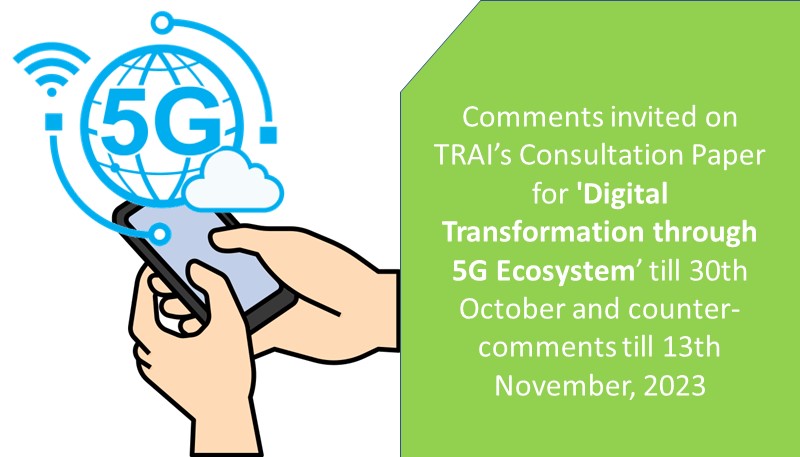Comments invited on TRAI’s Consultation Paper for ‘Digital Transformation through 5G Ecosystem’ till 30th October and counter-comments till 13th November, 2023

The Telecom Regulatory Authority of India (“TRAI”) has issued a consultation paper on Digital Transformation through 5G Ecosystem to identify the policy challenges and suggest the right policy framework for faster adoption and effective utilisation of new technologies for the holistic and sustainable development of the economy driven by 5G ecosystem. Comments are invited from all stakeholders till 30th October, 2023 and counter-comments are to be submitted by 13th November 2023.
Comments and counter-comments may be sent, preferably in electronic form, to the email ID: advadmn@trai.gov.in and vibhatomar@trai.gov.in. For clarification/ information, Ms. Vandana Sethi, Advisor (Admin) may be contacted at Telephone No. +91-11-23221509.
Issues for Consideration:
1. Need for additional measures to further strengthen the cross-sector collaboration for development and adoption of 5G use cases in India;
2. Barriers in development of ecosystem for 5G use cases, which need to be addressed. Identify such barriers and suggest policy and regulatory interventions including incentives to overcome such barriers. Provide the details of the measures taken by other countries to remove such barriers;
3. Policy measures to create awareness and promote use of 5G technology and its infrastructure so that the citizens (including those residing in rural and remote areas) may benefit from the 5G use cases and services to create new economic activities and increase employment opportunities and thereby promote economic growth of the country;
4. Policy measures to promote use of IoT technology and its infrastructure so that the citizens may benefit from 5G enabled IoT smart applications and services to create new economic activities and increase employment opportunities and thereby promote economic growth of the country;
5. Initiatives to be taken by the Government to spread awareness among the citizens about IoT enabled smart applications. Requirement for private companies / startups developing such applications to be engaged in this exercise through some incentivization schemes;
6. Industry 4.0 encompasses Artificial intelligence, Robotics, Big data, and the Internet of things and set to change the nature of jobs:
• Measures for upskilling the top management and owners of industries;
• Measures for upskilling the workforce of industries;
• Public private partnership models can be adopted for this upskilling task.
7. Policy, regulatory and other challenges faced by MSMEs in India in adoption of Industry 4.0. Measures to address these challenges. Detailed justification with reasons along with the best practices in other countries;
8. Additional measures required to strengthen the National Trust Centre (“NTC”) framework for complete security testing and certification of Internet of Things (“IoT”) devices (hardware as well as software) under DoT / TEC;
9. Need to develop sector-specific IoT security and privacy guidelines and the need for a common framework and methodology for developing such sector-specific guidelines;
10. Regulatory and policy interventions required to ensure privacy of the massive amount of sensitive user data generated by IoT applications specifically in light of the Digital Personal Data Protection Act, 2023;
11. Additional policy and regulatory measures required to encourage research and development of IoT use cases in various sectors;
12. Measures to encourage centres of excellence to handhold startups working in the development of use cases and applications in 5G and beyond technologies;
13. Changes in relevant laws to handle various issues, including liability regime and effective mechanism for redressal and compensation in case of accidents, damages, or malfunctions involving IoT, drones, or robotic systems;
14. Policy measures to create awareness and promote use of Metaverse, so that the citizens (including those residing in rural and remote areas) may benefit from the Metaverse use cases and services to create new economic activities and increase employment opportunities and thereby promote economic growth of the country;
15. Need to establish experimental campuses where startups, innovators, and researchers can collaborate and develop or demonstrate technological capabilities, innovative use cases, and operational models for Metaverse;
16. How can India play a leading role in metaverse standardization work being done by ITU? What mechanism should be evolved in India for making effective and significant contribution in Metaverse standardisation? Kindly provide elaborate justifications in support of your response;
17. Need to establish a regulatory framework for content moderation in the metaverse, given the diversity of cultural norms and values, as well as the potential for harmful or illegal content such as hate speech, misinformation, cyberbullying, and child exploitation;
Background:
With the introduction of 5G services in India, Telecom Service Providers are actively expanding the 5G network throughout the nation. The government has initiated various measures to construct 5G infrastructure and promote research and development. Additionally, TRAI has issued several recommendations to expedite the deployment of 5G network and services in the Country. With a view to fully unlock the potential of 5G technology, it is imperative to develop and deploy new use cases for both consumers and enterprises, often incorporating complementary technologies. Addressing the challenges and issues associated with the development and deployment of these new technology-driven use cases requires an innovative policy and regulatory framework. TRAI has released a consultation paper proactively to identify policy challenges and propose an appropriate policy framework for the swift adoption and effective utilization of new technologies, fostering holistic and sustainable economic growth driven by the 5G ecosystem.
A copy of the consultation paper is linked below for your ease of reference.